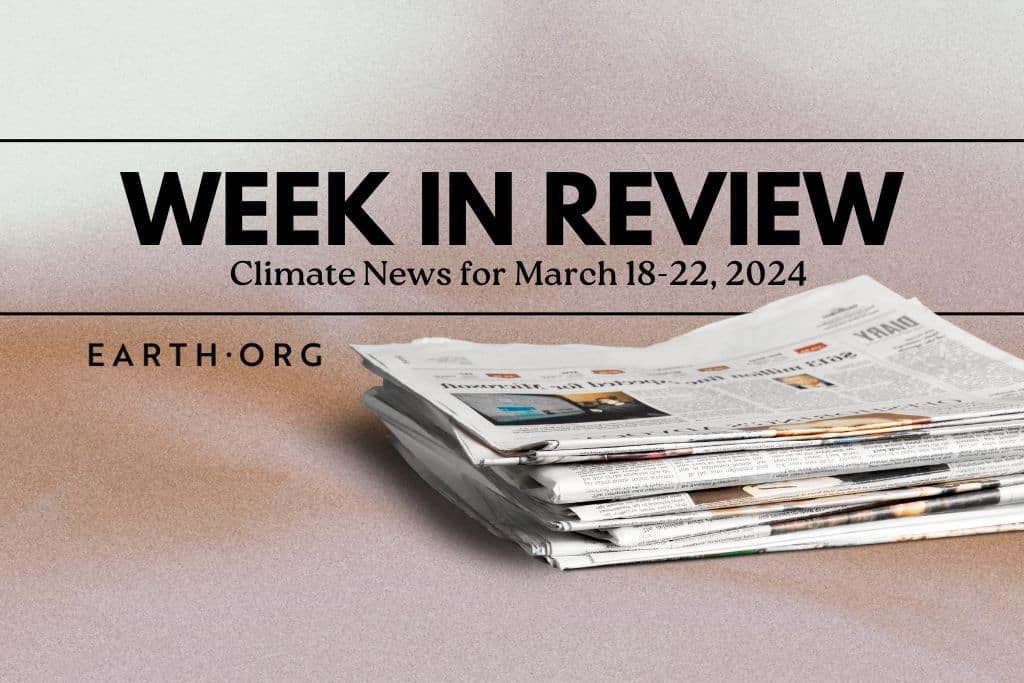This weekly round-up brings you key climate news from the past seven days, including the latest data on air quality around the world and a groundbreaking greenwashing lawsuit involving a Dutch airline.
—
1. Only Seven Countries Met WHO Air Quality Standards in 2023, Report Finds
Only seven countries in the world – less than 4% – had air quality levels at or below the healthy annual average recommended by the World Health Organization (WHO) in 2023, a new report has found.
Exceptions made for Australia, Estonia, Finland, Grenada, Iceland, Mauritius, and New Zealand, all countries exceeded the annual level last year, Swiss air quality organization IQAir said in its annual report published on Wednesday, with several regions recording highly dangerous pollution levels.
These include Bangladesh, historically among the most polluted countries in the world and the worst in 2023, with PM2.5 levels more than 15 times higher than WHO standards, Pakistan (more than 14 times higher), and India (more than 10 times higher). Tajikistan and Burkina Faso followed closely.
Read more here.
2. Experts Slam FAO for ‘Dismissing’ Meat Reduction Plan and Alt-Protein From Climate Roadmap
In a commentary published Wednesday in the scientific journal Nature Food, a group of experts from academic institutions in the US, the Netherlands, and Brazil said the UN agency had “missed opportunities for greenhouse gas emissions reduction.”
Published during the UN climate summit COP28 in December last year, the first of three instalments of the FAO roadmap outlines several interrelated food security and climate objectives, introduces milestones for ten pivotal domains, and puts forward a total of 120 recommended actions.
Despite introducing a “range of quantified goals and milestones,” the experts argued that it remained unclear “how the roadmap’s 120 proposed interventions were chosen – and how they will put the world on a path to limiting warming to 1.5°C.”
Read more here.
3. US Sees Warmest Winter on Record With Temperatures 5.4F Above Average, National Weather Agency Says
The average temperature in December, January, and February was 37.6F (3.1C), 5.4F above average. Eight states – Iowa, Michigan, Minnesota, New Hampshire, New York, North Dakota, Vermont and Wisconsin – had their warmest winter on record, while winter temperatures were among the top-10 highest ever recorded across 26 additional states, according to the national weather agency.
The announcement came after February was confirmed the third-warmest in the US since records began 130 years ago, with an average temperature of 41.1F (5.05C). Last month was also the hottest February worldwide and the ninth month consecutively that recorded temperatures for a particular month have reached unprecedented levels.
Read more here.
4. E-Waste Recycling Rates Remain Dangerously Low as Demand for Electronic Devices Booms, UN Report Reveals
In 2022, the world generated a record 62 billion kilograms of electronic waste, or e-waste – equivalent to an average of 7.8 kg per capita per year and up 82% from 2010, according to the latest Global E-Waste Monitor by the UN Institute for Training and Research (UNITAR).
Unfortunately, recycling rates remain dangerously low worldwide, making e-waste a huge global crisis that requires “urgent attention,” as put by UNITAR’s executive director Nikhil Seth.
As highlighted in the report, only 22.3% of the total electronic waste generated in 2022 was documented as formally collected and recycled in an environmentally sound manner. In other words, e-waste generation is outpacing the rise in formal recycling by a factor of almost 5.
Globally, only 42% of countries have adopted some kind of e-waste policy, regulation, or legislation, though enforcement remains “a genuine challenge globally,” mainly owing to a lack of collection and recycling targets, low awareness, and few appropriate disposal options, according to the report.
Read more here.

5. Greenwashing: Dutch Airline KLM’s Ads ‘Misleading’, Court Rules
The “Fly Responsibly” campaign, launched in 2019 to celebrate KLM’s 100th anniversary, called on stakeholders in aviation – including airlines, partners, customers, and employees – to “join forces in the development of sustainable solutions for the industry,” which is responsible for about 2% of global energy-related carbon dioxide (CO2) emissions.
In July 2022, Dutch environmental group Fossil Free filed a groundbreaking lawsuit against KLM, the first-ever legal claim challenging airline industry greenwashing, challenging KLM’s advertising as “misleading.” According to the group, the campaign gave the impression that the airline was actively tackling climate change, while, in fact, its plans for air traffic growth would only exacerbate the crisis. The lawsuit also addressed the airline’s carbon offsetting strategy, which, the group argued, misled customers into thinking that they could offset their flight’s emissions by supporting reforestation projects or the airline’s costs of purchasing small quantities of biofuels.
Read more here.

















